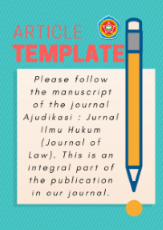Regulasi Layanan Kesehatan Digital di Indonesia: Tantangan Etis dan Hukum
DOI:
https://doi.org/10.30656/ajudikasi.v7i2.7862Keywords:
Digital, Health Services, Regulation, EthicsAbstract
Digitalization promotes more effective and efficient health-care services. Following the COVID-19 epidemic, there has been a surge in global interest and investment in digital healthcare. WHO has issued guidelines and recommendations to countries in order for them to properly use telemedicine on a global scale. This is not only beneficial to people who want to protect themselves against COVID-19 and other diseases to which they may be susceptible, but it also has the potential to increase access to health care. There are various problems in integrating digital healthcare across the country in Indonesia, a country that does not yet have universal healthcare and struggles with high levels of skepticism in the public health system. Indonesian technology laws currently do not explicitly control telehealth, nor do suitable data protection regulations exist to manage the massive volumes of data generated by digital health services if adopted on a wide scale. Furthermore, there are concerns regarding the level of patient privacy, which may be jeopardized by digital health services. Aside from legal concerns about privacy, there is no framework in place to ensure informed consent in the context of digital healthcare. In this study, the researcher examines the legal, structural, and ethical difficulties surrounding digital health and offer insight into the problems caused by these flaws, as well as policy proposals to remedy these issues. The outcomes of the discussion indicate that data protection rules in Indonesia must address the different concerns listed above. Furthermore, gaps in health-care access and public-sector distrust make universal implementation of digital health services difficult. Aside from legal considerations, the digitalization of health services in Indonesia has ethical implications. The key ethical considerations are informed consent, which is a critical issue, particularly for marginalized groups with poor reading levels and communities that have historically been targets of medical exploitation.
Downloads
References
Buku
Duguit, L. (2018). Revival: Law in the Modern State (1921). Routledge.
Fatihudin, D., & Firmansyah, A. (2019). Pemasaran Jasa (strategi, mengukur kepuasan dan loyalitas pelanggan). Deepublish.
Gillon, R. Consent. Br. Med. J. Clin. Res. Ed. 1985, 291, (2019),1700.
Kansil, C. S. T. "Introduction to Indonesian Law and Legal Administration." Jakarta: Balai Pustaka (1989).
London, Leslie. "What is a human-rights based approach to health and does it matter?." Health and human rights (2008): 65-80.
Nishith Desai Associates. (2020). ESG. Prevalence and Relevance. Nishith Desai Associates
Subekti. Basics of Civil Law. Jakarta. PT Intermasa. 2018.
Supriadi, S. (2021). Urgensi pemeriksaan kesehatan pranikah sebagai upaya membentuk keluarga harmonis (Studi Kasus di Dusun Memelak Desa Gerunung Kec. Praya Kab. Lombok Tengah) (Doctoral dissertation, UIN Mataram).
Jurnal
Bach, R. L., & Wenz, A. (2020). Studying health-related internet and mobile device use using web logs and smartphone records. PloS one, 15(6), e0234663.
Batara, D. C., Park, S. W., Kim, H. J., Choi, S. Y., Ohn, T., Choi, M. C., ... & Kim, S. H. (2023). Targeting the multidrug and toxin extrusion 1 gene (SLC47A1) sensitizes glioma stem cells to temozolomide. American Journal of Cancer Research, 13(9), 4021.
Bauer, Keith A. "Privacy and Confidentiality in the Age of E-Medicine." J. Health Care L. & Pol'y 12 (2009): 47.
Castelo, M., Hu, S. Y., Dossa, F., Acuna, S. A., & Scheer, A. S. (2020). Comparing observation, axillary radiotherapy, and completion axillary lymph node dissection for management of axilla in breast cancer in patients with positive sentinel nodes: a systematic review. Annals of surgical oncology, 27, 2664-2676.
Jain, Dipika, and Brian Tronic. "Tuberculosis in India: A human rights approach to healthcare." Sw. J. Int'l L. 24 (2018): 219.
Muhammad Hutomo, Kurniawan, Lulu Wira Pria S. Legal Protection for Patients Using Online Services. Journal of Education and development, South Tapanuli Education Institute. Vol. 8, 3. (2020).
Pai, Manohara MM, Raghavendra Ganiga, Radhika M. Pai, and Rajesh Kumar Sinha. "Standard electronic health record (EHR) framework for Indian healthcare system." Health Services and Outcomes Research Methodology 21, no. 3 (2021): 339-362.
Rahmawati, R., Putri, Y. H., Su'da Ramadhani, J., Hanuun, A., & Pebiani, T. (2022). Penyuluhan Penggunaan Oralit Pada Diare Anak dan Demo Cuci Tangan yang Baik dan Benar. To Maega: Jurnal Pengabdian Masyarakat, 5(1), 75-83.
Rani Tiyas Budiyanti. Ethical and Legal Challenges of Using Electronic Medical Records in the Era of Personalized Medicine. Journal of Vocational Health, Vol. 4 No. 1 (2019) ISSN 2541-0644 (print), ISSN 2599-3275 (online) DOI hps://doi.org/10.22146/jkesvo.41994.
Rosadi, Sinta Dewi. "Protecting privacy on personal data in digital economic era: Legal framework in Indonesia." Brawijaya Law Journal 5, no. 1 (2018): 143-157.
Shalev, Carmel. "Rights to sexual and reproductive health: the ICPD and the convention on the elimination of all forms of discrimination against women." Health and human rights (2000): 38-66.
Trocin, Cristina, Patrick Mikalef, Zacharoula Papamitsiou, and Kieran Conboy. "Responsible AI for digital health: a synthesis and a research agenda." Information Systems Frontiers (2021): 1-19.
Peraturan Perundang-Undangan
Article 28C paragraph (1) of the 1945 Constitution;
Law Number 36 of 2009 concerning Health; Law Number 29 of 2004 concerning Medical Practice;
Law Number 19 of 2016 concerning Amendments to Law Number 11 of 2008 concerning Electronic Information and Transactions;
Law Number 44 of 2009 concerning Hospitals;
Government Regulation Number 46 of 2014 concerning Health Information Systems;
Minister of Health Regulation Number 269 of 2008 concerning Medical Records;
Minister of Health Regulation Number 46 of 2017 concerning National e-Health Strategy;
Minister of Health Regulation Number 20 of 2019 concerning the Implementation of Telemedicine Between Health Service Facilities;
Minister of Health Decree Number HK.01.07/MENKES/4829/2021 concerning Guidelines for Health Services Via Telemedicine During the Corona Virus Disease 2019 (Covid-19) Pandemic.
Indonesian Medical Council Regulation Number 74 of 2020 concerning Clinical Authority and Medical Practice via Telemedicine During the Corona Virus Disease 2019 (Covid-19) Pandemic in Indonesia.
Circular Letter of the Minister of Communication and Information Number 3 of 2016 concerning Provision of Application Services and/or Content Via the Internet (Over The Top).
Circular Letter of the Minister of Communication and Information Number 5 of 2016 concerning Limitations and Responsibilities of Platform Providers and Traders Trading Through Electronic Systems (Electronic Commerce) in the form of User Generated Content.
Minister of Health Circular No. HK.02.01.MENKES/303/2020 concerning the Implementation of Health Services Through the Use of Information and Communication Technology in the Context of Preventing the Spread of Covid-19.
Website
Allen, Anita. "Privacy and medicine." (2009)., 13 May 2023. Available online: https://plato.stanford.edu /Entries/privacy-medicine/(accessed on 20 November 2023).
Daley, S. 32 Examples of AI in Healthcare That Will Make You Feel Better about the Future, BuiltIn. 2020. Available online: https://builtin.com/artificial-intelligence/artificial-intelligence-healthcare (accessed on 20 January 2023).
Kumar, R.; Musyuni, P. India: Digital Health 2020, Mondaq. 2020. Available online: https://www.mondaq.com/india/healthcar e/902762/digital-health-2020 (accessed on 20 January 2023).
Ranganathan, S. Towards a Holistic Digital Health Ecosystem in India. Observer Research Foundation, 2 April 2020. Available online: https://www.orfonline.org/research/towards-a-holistic-digital-health-ecosystem-in-india-63993/?amp(accessed on 11 November 2023).
Reddy, S. Use of Artificial Intelligence in Healthcare Delivery. 2018. Available online: https://www.intechopen.com/books/ehe alth-making-health-care-smarter/use-of-artificial-intelligence-in-healthcare-delivery (accessed on 20 November 2023).
Singh, T.; Kaushik, S.. Digital Personal Data Protection Bill (Dpdp Bill). 2022 Available online: https://www.lawrbit.com/article/ digital-personal-data-protection-bill-2022/ (accessed on 20 November 2023).
World Health Organization. Global Strategy on Digital Health 2020–2025; Licence: CC BY-NC-SA 3.0 IGO; World Health Organization: Geneva, Switzerland, 2021; Available online: https://www.who.int/docs/default-source/documents/gs4dhdaa2a9f352b04 45bafbc79ca799dce4d.pdf (accessed on 20 November 2023).
World Health Organisation. WHO Guideline: Recommendations on Digital Interventions for Health System Strengthening; World Health Organization: Geneva, Switzerland, 2019; Available online: https://apps.who.int/iris/bitstream/handle/10665/311941/ 9789241550505-eng.pdf (accessed on 20 November 2023).
Downloads
Published
Issue
Section
License
Authors who publish with this journal agree to the following terms:
Authors retain copyright and grant the journal right of first publication with the work simultaneously licensed under a Creative Commons Attribution License that allows others to share the work with an acknowledgment of the work's authorship and initial publication in this journal.
Authors can enter into separate, additional contractual arrangements for the non-exclusive distribution of the journal's published version of the work (e.g., post it to an institutional repository or publish it in a book) with an acknowledgment of its initial publication in this journal.
Authors are permitted and encouraged to post their work online (e.g., in institutional repositories or on their website) before and during the submission process, as it can lead to productive exchanges and earlier and greater citation of published work.
All articles in Ajudikasi : Jurnal Ilmu Hukum can be disseminated provided they include the identity of the article and the source of the article (Ajudikasi : Jurnal Ilmu Hukum). The publisher is not responsible for the contents of the article. The content of the article is the sole responsibility of the author
Ajudikasi : Jurnal Ilmu Hukum is lincensed under a Creative Commons Attribution-ShareAlike 4.0 International License.









1.png)
.png)
.png)





.png)
.png)
.png)
.png)





.png)







